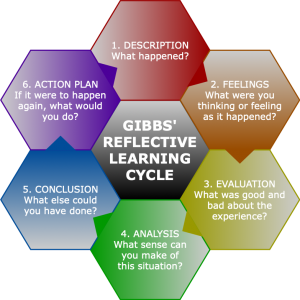Reflective writing encourages you to make observations about your experiences and beliefs and link these with the theoretical learning in your subject. It encourages you to think about what you have learned and how you have learned it. This helps you to create new knowledge. When undertaking a reflective writing task, you need to draw connections between what you have been asked to reflect on and relevant theories. Drawing connections between theory and experience or learning helps create new understandings.
When reflecting on your learning you might address the following questions:
- Description – What is the concept, idea, or theory you are reflecting on?
- Analysis – Are there aspects you found particularly interesting or challenging? Does it tie in with anything you have learned in the past? Has it changed the way you think, or affirmed something you already knew?
- Outcomes or Action – What else might you need to find out? Do you have any questions? How might you incorporate or apply these ideas in the future, perhaps in your professional life?
Some students make the mistake of thinking that reflective writing simply requires you to recount an event or describe a scenario. Reflection within university assignments pushes beyond this. It requires you not only to narrate or describe, but also to analyse.
Gibbs’ Reflective Cycle

Gibbs’ Reflective Cycle was developed by Graham Gibbs in 1988 to give structure to learning from experiences. It offers a framework for examining experiences, and given its cyclic nature lends itself particularly well to repeated experiences, allowing you to learn and plan from things that either went well or didn’t go well. It covers 6 stages:
- Description of the experience
- Feelings and thoughts about the experience
- Evaluation of the experience, both good and bad
- Analysis to make sense of the situation
- Conclusion about what you learned and what you could have done differently
- Action plan for how you would deal with similar situations in the future, or general changes you might find appropriate.
Sources
- “Gibbs’ Reflective Cycle.” The University of Edinburgh, March 20, 2019. https://www.ed.ac.uk/reflection/reflectors-toolkit/reflecting-on-experience/gibbs-reflective-cycle.
- “Reflective Practice.” The University of Sheffield. Accessed May 2, 2019. https://www.sheffield.ac.uk/ssid/301/study-skills/university-study/reflective-practice.
- “Reflective Writing: About Gibbs Reflective Cycle.” Oxford Brookes University. Accessed May 2, 2019. https://www.brookes.ac.uk/students/upgrade/study-skills/reflective-writing-gibbs/.
- “Reflective Writing in Education.” Monash University. Accessed May 2, 2019. https://www.monash.edu/rlo/assignment-samples/education/education-reflective-writing.



